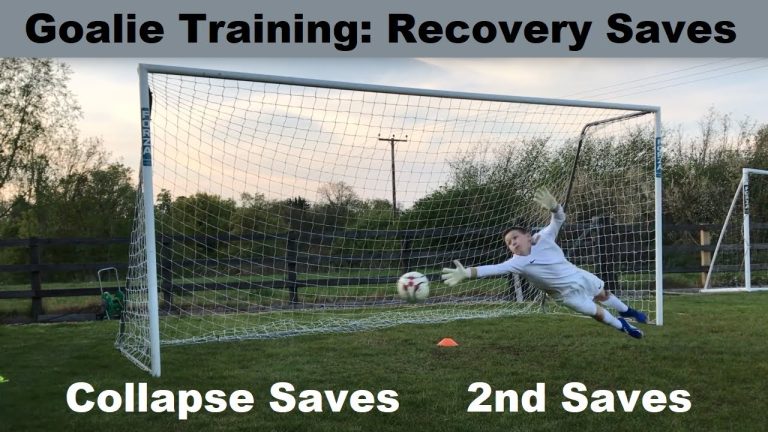In the high-pressure world of soccer, goalkeepers play a crucial role in saving their teams from defeat. But what happens after a save? How do these athletes bounce back and maintain their composure? In this article, we will explore top tips and strategies for goalkeepers to recover both physically and mentally after making a save. From effective breathing techniques to mental resilience exercises, these tried-and-tested methods will help goalkeepers regain their focus and continue to excel on the field. So, whether you’re a seasoned goalkeeper or just starting out, read on to discover the secrets of recovering after a save and becoming an unbeatable force between the posts.
Advantages
- Advantages of recovering after a save for goalkeepers:
- Quick reaction time: One advantage of recovering after a save is that it allows goalkeepers to showcase their quick reaction time. After making a save, goalkeepers need to be able to quickly recover and position themselves for any potential follow-up shots or rebounds. Being able to react swiftly can give goalkeepers an edge in preventing the opposition from scoring.
- Maintaining focus and composure: Another advantage of recovering after a save is that it helps goalkeepers maintain their focus and composure. Making a save can be an intense moment, and it’s crucial for goalkeepers to quickly regroup and stay mentally sharp. By recovering efficiently, goalkeepers can minimize the chances of making mistakes due to being off-balance or losing concentration, ultimately improving their overall performance.
Disadvantages
- Fatigue and Muscle Soreness: Goalkeepers often perform intense physical activities during a game, such as diving, jumping, and sprinting. This can lead to fatigue and muscle soreness, making it challenging for them to recover quickly after a save. This can affect their overall performance during the match.
- Risk of Injury: Goalkeepers are at a higher risk of sustaining injuries due to the nature of their position. While making saves, they may experience collisions with other players or land awkwardly, leading to sprains, strains, or even more severe injuries like fractures or concussions. Recovering from injuries can take time and hinder their ability to play at their best.
- Psychological Pressure: After making a save, goalkeepers often face immediate pressure to quickly distribute the ball or make another critical play. This can create mental stress and anxiety, affecting their decision-making abilities. The pressure to recover quickly and perform well can sometimes lead to poor decision-making or mistakes, impacting the team’s overall performance.
- Lack of Time to Regain Focus: After a save, goalkeepers need to regain their focus and concentration to be prepared for the next potential threat. However, the fast-paced nature of the game may not allow them enough time to fully recover mentally. This can result in decreased alertness, diminished reaction time, and potentially missing crucial saves or making errors in judgment.
How much time does it usually take for a goalkeeper’s broken finger to heal?
Goalkeepers who suffer from a broken finger should be prepared for a significant amount of time on the sidelines. On average, a metacarpal fracture can take around 26 days to fully heal, while phalange fractures can take more than double that amount of time, with a median recovery period of 55 days. Patience and proper care are crucial for goalkeepers looking to make a full recovery from these injuries.
What is the reason for goalies laying down after making a save?
Goalkeepers often choose to lay down after making a save for two main reasons. The first is to prevent any potential spills that opponents could challenge for, ensuring they maintain control of the ball. By going to the ground, goalies eliminate the risk of giving their opponents an opportunity to score from a rebound. Secondly, they may opt to lay down if they perceive a minor error that could result in the ball going past them. This helps them buy some time as they doubt their ability to collect the ball before the opponent can touch it. Overall, this strategic decision not only showcases their agility and quick thinking, but also minimizes the chances of conceding a goal.
What is the recommended course of action following a challenging game?
After a grueling game, it’s important to give your body the care it deserves. Start by properly hydrating and replenishing your energy levels with a nutritious meal. Take a moment to reflect on the game, analyzing both your strengths and areas for improvement. Engage in some light stretching or foam rolling to relieve any muscle tension and promote recovery. Finally, give yourself some well-deserved rest by getting a good night’s sleep. Remember, taking care of your body after a tough game is crucial for optimal performance in future matches.
When the final whistle blows and emotions run high, it’s essential to take care of your mental well-being after a tough game. Give yourself the chance to decompress and process any feelings of frustration or disappointment. Engage in activities that help you relax and unwind, such as reading a book or listening to calming music. Reach out to your support system, whether it be friends, family, or teammates, to share your thoughts and emotions. Remember, taking care of your mental health is just as important as taking care of your physical health, and it will help you bounce back stronger for the next challenge.
Bouncing Back: Essential Recovery Techniques for Goalkeepers
Bouncing Back: Essential Recovery Techniques for Goalkeepers
1. As a goalkeeper, the ability to bounce back quickly after conceding a goal is crucial. The pressure is on, and your team relies on you to stay focused and make crucial saves. To recover effectively, take a moment to acknowledge the goal and then let it go. Channel your frustration into motivation, and remind yourself that every save counts. By maintaining a positive mindset and quickly regaining your composure, you’ll be ready to face the next challenge head-on.
2. Physical recovery is just as important as mental recovery for goalkeepers. After a goal, take a few deep breaths and use this time to stretch your muscles and shake off any tension. Utilize techniques such as foam rolling or light jogging to keep your body active and prevent any stiffness. Additionally, proper hydration and nutrition play a significant role in recovery. Ensure you replenish your fluids and consume a balanced meal or snack to provide your body with the necessary fuel for the remainder of the game.
3. One of the most effective recovery techniques for goalkeepers is analyzing the goal and learning from it. Instead of dwelling on the mistake, take the opportunity to identify any weaknesses in your technique or positioning. Discuss the goal with your coach or teammates, seeking their input and advice. Use this feedback to enhance your skills and make adjustments for future situations. Remember, every setback is an opportunity for growth, and by learning from your mistakes, you’ll become a stronger and more resilient goalkeeper.
The Art of Swift Recovery: Mastering the Goalkeeper’s Game
The art of swift recovery lies at the heart of mastering the goalkeeper’s game. With lightning-fast reflexes and unwavering focus, a goalkeeper must anticipate every move, ready to leap into action at a moment’s notice. Like a well-choreographed dance, their movements are precise and calculated, ensuring that no ball slips through their grasp. Their eyes lock onto the trajectory of each shot, their hands poised to make the save. With unwavering determination, they dive, stretch, and contort their bodies to deny the opposition any chance of scoring. It is a captivating display of athleticism and skill, a symphony of agility and bravery, as the goalkeeper becomes the ultimate guardian of the goal.
Save, Recover, Repeat: Expert Tips for Goalkeepers’ Quick Comebacks
Save, Recover, Repeat: Expert Tips for Goalkeepers’ Quick Comebacks
In the high-pressure world of goalkeeping, the ability to bounce back quickly from setbacks is crucial. Whether it’s letting in a goal or making a critical mistake, goalkeepers need to have a short memory and a quick recovery mindset. The first tip from the experts is to analyze the situation objectively, focusing on what went wrong and how to improve. By taking a step back and analyzing the mistake, goalkeepers can learn from it and make the necessary adjustments. Additionally, staying mentally strong is key. Goalkeepers should practice visualization techniques to imagine themselves making successful saves and bouncing back from setbacks. By building mental resilience, goalkeepers can quickly recover and get back into the game with confidence.
Save, Recover, Repeat: Expert Tips for Goalkeepers’ Quick Comebacks
Goalkeepers are often the last line of defense and have the crucial responsibility of saving their team from defeat. To ensure quick comebacks, experts suggest goalkeepers need to develop a strong support system. Having a trusted coach, teammates, or mentor who can provide guidance and encouragement is crucial in times of setbacks. Additionally, goalkeepers should focus on their physical fitness. Regular training sessions that include agility and reflex exercises can help them react quickly to unexpected situations. By combining mental resilience with physical preparedness, goalkeepers can save the day and make quick comebacks a regular part of their game.
In a game that demands split-second reactions and unwavering focus, goalkeepers hold the key to their team’s success. With the pressure of recovering after a save, these indispensable players must possess mental fortitude and resilience. By implementing these tips, such as staying composed, learning from mistakes, and maintaining a positive mindset, goalkeepers can confidently navigate the challenges they face. So, the next time the ball finds its way into the back of the net, remember that true champions are measured not by their mistakes, but by their ability to bounce back and emerge even stronger.



